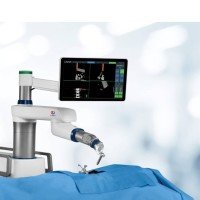Current Statistics
According to the Hong Kong Cancer Registry, the incidence of kidney cancer has increased by 47% in the past 10 years, and the surge is believed to be related to the increased obesity rate and women's smoking rate. Kidney cancer most commonly occurs between the ages of 50 and 75 and is more common in men than women.
What is Kidney Cancer?
Located on each side of the spine and right behind the intestines, the kidneys have a major role in removing excess fluid, electrolytes and waste material from the blood. When there is abnormal cell growth in the kidneys, the growth may develop into one or more malignant tumors in one or both kidneys.
Kidney cancer, also called renal cancer, can be divided into several types, namely renal cell carcinoma, renal pelvis cancer, and renal adenocarcinoma, based on the cell morphology of the cancer tumor.
Symptoms of Kidney Cancer
Early-stage kidney cancer does not show noticeable symptoms. Most patients are often only diagnosed when the disease has already progressed to the middle or late stages, which greatly increases the difficulty of treatment.
- Waist pain and back pain
- Blood in the urine (hematuria)
- Lump in the abdomen
- Loss of appetite
- Weight loss
- Fatigue
Causes of Kidney Cancer & Risk Factors for Kidney Cancer
Causes of Kidney Cancer
Like most cancers, the cause of kidney cancer is unknown, but some factors can increase the risk, such as smoking and family inheritance, etc.
Risk Factors for Kidney Cancer
- Smoking
- Obesity (BMI>30)
- Family inheritance
- People on dialysis
- Frequent, occupation-related exposure to cadmium, asbestos, and petroleum
- Long-term use of phenacetin, a type of analgesics
How is kidney cancer diagnosed?
- Preliminary examinations: Blood test and urine test results can be used as a reference. Cancer cells are often found in the urine of renal pelvis cancer patients. Blood tests, on the other hand, can help check the patient’s blood calcium level, blood cell count, and kidney function.
- Imaging examinations: If a patient is suspected to have kidney cancer, further examinations are recommended for a more accurate diagnosis. Abdominal ultrasound is one of the common options. It uses sound waves to produce pictures of the kidneys to determine if the abnormal growth is a tumor or a cyst. Aside from abdominal ultrasound, computerized tomography (CT) scans can effectively detect tumors in very small sizes and produce a 3D image of the tumor. It can also show if the cancer cells have spread to the nearby lymph nodes or tissues outside the kidneys. In addition, magnetic resonance imaging (MRI) can produce images of soft tissue and blood vessels to assess the metastasis of kidney cancer.
Stages of Kidney Cancer
| Stage 1 | The tumor is less than 7 cm in diameter and is still only in the kidney. There is no spread to lymph nodes. |
|
Stage 2 |
The tumor is larger than 7 cm in diameter and is still only in the kidney. There is no spread to lymph nodes. |
|
Stage 3 |
Cancer cells have grown into the renal vein or the vena cava, cancer cells have spread to one nearby lymph node, or they have grown into the adrenal gland but are still within the Gerota’s fascia. |
|
Stage 4 |
Cancer cells have spread to more than one lymph node, or cancer cells have spread beyond the Gerota’s fascia. |
Treatments for Kidney Cancer
For patients with stage 1 to 3 kidney cancer, surgery is the only possible treatment; chemotherapy and radiotherapy are not very effective in terms of treating the disease.
|
Surgery |
For early-stage, non-metastasized kidney cancer, surgery is the most common way to remove the tumor. Depending on the size of the tumor, doctors may consider partial or total nephrectomy. With the assistance of the advanced da Vinci Surgical System that features robotic arms, only multiple small incisions are required to remove the tumor precisely. Compared with traditional surgery, robotic-assisted systems have advantages such as fewer wounds, less blood loss, and faster recovery. Most kidney functions can be preserved. |
|
Targeted therapy |
For patients with middle to late stages of kidney cancer, targeted therapy is recommended to control the disease as cancer has already metastasized to other parts of the body. There are a variety of targeted drugs available on the market, some of which block signals that make cancer cells grow. They can also cut off the blood supply that feeds cancer cells. |
|
Immunotherapy |
Immunotherapy makes use of the patient’s immune response mechanism to fight against cancer cells. It can reinvigorate T-cells, which is a type of immune cell, and they can recognize cancer cells and attack them. Side effects are generally mild and limited. |






















